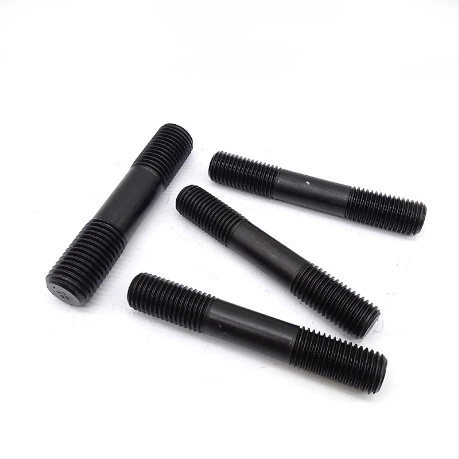

Exploring the Features and Applications of M24 Stud Bolts in Construction and Engineering
Nov . 27, 2024 21:45 Back to list
Exploring the Features and Applications of M24 Stud Bolts in Construction and Engineering
Understanding M24 Stud Bolts Features, Applications, and Benefits
M24 stud bolts are crucial components used in various engineering applications, particularly in construction, manufacturing, and assembly operations. Their design and specifications make them ideal for high-strength connections, providing durability and reliability in numerous settings. This article delves into the features, applications, and benefits of M24 stud bolts, illustrating why they are a preferred choice in many industries.
Features of M24 Stud Bolts
The term M24 refers to the nominal diameter of the stud bolt, which is 24 millimeters. The M designates that it is a metric bolt, adhering to international standards that facilitate compatibility and uniformity in engineering projects. M24 stud bolts are characterized by several key features
1. Material Composition M24 stud bolts are typically made from high-strength materials such as carbon steel or stainless steel, which provide excellent tensile strength and corrosion resistance. The choice of material depends on the specific application and environmental conditions.
2. Thread Specifications These bolts possess metric coarse threads, which are designed for optimal load distribution and enhanced grip. The standard thread pitch for M24 bolts is usually 3.0 mm, although variations can occur depending on the application's requirements.
3. Length Variability M24 stud bolts come in various lengths, allowing engineers and contractors to select appropriate sizes for specific applications, ensuring that they can accommodate different joint designs and load requirements.
4. Surface Treatments To improve their performance, M24 stud bolts may undergo various surface treatments, such as galvanization or plating. These processes enhance their resistance to corrosion and wear, making them suitable for outdoor and harsh environments.
Applications of M24 Stud Bolts
Due to their strength and versatility, M24 stud bolts find applications across multiple sectors
1. Construction In construction, M24 stud bolts are used to secure structural components, such as beams and columns, ensuring building integrity. They are pivotal in high-rise buildings, bridges, and industrial facilities, where load-bearing capabilities are critical.
m24 stud bolt

2. Manufacturing M24 stud bolts are commonly used in the manufacturing of heavy machinery, automotive components, and equipment assembly. Their reliability and strength ensure that machinery can withstand stress and operational demands.
3. Oil and Gas Industry In the oil and gas sector, M24 stud bolts are essential for securing pipelines, drilling rigs, and other critical infrastructure. Their ability to withstand extreme pressures and corrosive environments makes them particularly valuable in this field.
4. Marine Applications Given their corrosion resistance, M24 stud bolts are frequently used in marine environments for shipbuilding and underwater construction. They help secure critical components exposed to saltwater and harsh weather conditions.
Benefits of Using M24 Stud Bolts
The advantages of utilizing M24 stud bolts extend beyond their structural applications
1. High Load Capacity M24 stud bolts can support substantial loads, making them ideal for heavy-duty applications that require robust fastening solutions.
2. Time Efficiency The ease of installation and removal of M24 stud bolts contributes to faster construction and assembly times. This efficiency can lead to substantial cost savings on labor and project timelines.
3. Standardization As metric components, M24 stud bolts conform to international standards, making it easier for engineers worldwide to design compatible systems and ensure quality.
4. Safety Assurance The reliable fastening provided by M24 stud bolts contributes to the overall safety of structures and machinery. Ensuring that components remain securely fastened minimizes the risk of failures that could compromise safety.
Conclusion
M24 stud bolts play an integral role in many industries by providing strong, reliable, and versatile fastening solutions. Their features—material composition, thread specifications, and length variability—make them suitable for diverse applications, from construction to manufacturing to marine environments. Understanding the importance of M24 stud bolts ensures that engineers and contractors can make informed choices about the materials they use, ultimately leading to safer and more efficient projects. As technology advances and new materials emerge, the continued evolution of stud bolts will enhance their performance and adaptability in an ever-changing industrial landscape.
Latest news
-
Best Self Tapping Screws for Drywall - Fast & Secure Installation
NewsJul.31,2025
-
High-Strength Hot Dip Galvanized Bolts-Hebei Longze|Corrosion Resistance&Customization
NewsJul.31,2025
-
Hot Dip Galvanized Bolts-Hebei Longze Metal Products|Corrosion Resistance&High Strength
NewsJul.31,2025
-
Hot Dip Galvanized Bolts-About LongZe|High Strength, Corrosion Resistance
NewsJul.30,2025
-
High-Strength Hot Dip Galvanized Bolts - Hebei Longze | Corrosion Resistance, Customization
NewsJul.30,2025
-
Hot Dip Galvanized Bolts-Hebei Longze|Corrosion Resistance&High Strength
NewsJul.30,2025

